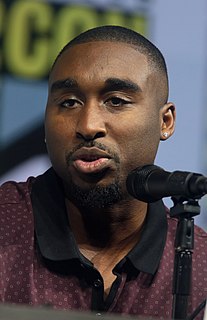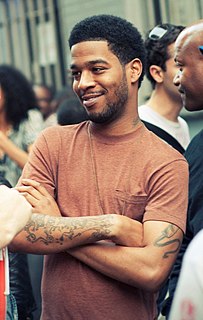A Quote by Jerry Leiber
Teenagers especially are very, very conscious about what is hip and what is lame and what is square and what is out and what is in, you know. And, I mean, I grew up right there in the middle of a black culture. And I knew dead-on what it was.
Related Quotes
I would say I'm black because my parents said I'm black. I'm black because my mother's black. I'm black because I grew up in a family of all black people. I knew I was black because I grew up in an all-white neighborhood. And my parents, as part of their protective mechanisms that they were going to give to us, made it very clear what we were.
Socially, hip-hop has done more for racial camaraderie in this country than any one thing. 'Cause guys like me, my kids - everyone under 45 either grew up loving hip-hop or hating hip-hop, but everyone under 45 grew up very aware of hip-hop. So when you're a white kid and you're listening to this music and you're being exposed to it every day on MTV, black people become less frightening. This is just a reality. What hip-hop has done bringing people together is enormous.
I think people respond to truth. 'Straight Outta Compton' made $60 million over the weekend, right? That's not just a black audience. 'Empire' grew every single week. That's not just a black audience. Black culture is American culture, you know what I mean? They're becoming more and more one in the same.
This is more in regards to celebrities. What we've got to understand is that we are the influencers of the hip-hop culture, the black culture. We are the way out, you feel what I'm sayin'? As far as who we look to and where we get stuff from - hip-hop culture is influencing the world, really, but especially the black communities.
I grew up in Columbia, Maryland, a planned community built during the sixties. During the early years, it was very integrated. I grew up being taught by black teachers with black principals and vice principals and, you know, a lot of black friends. We played in mixed groups, and I kind of thought that was how it was.
I will say it's great - that Method Man - Cliff Smith - plays a rapper in a laundromat who is working out some lyrics sort of to the rhythm of a washing machine. And something about hip-hop culture and hip-hop is the ability to use current language and slang and reference details of life is very, very strong for me.
I had a very brilliant father who was not only intellectual, but was street-smart and very curious to boot. The day I found out that he didn't know everything, I grew up. It was a shock. I just thought that the man was the end-all of everything, and he knew the answer to everything. Then I found out I'd have to find out my own answers.
A lot of the things I do deal with my race, but my race is who I am. I'm an American kid who grew up listening to predominantly hip-hop. I will talk about hip-hop as the music I grew up listening to, and I think sometimes people like to put it as, 'Oh, well, he's talking about black things.' And, yeah, they are, but that's my American identity.



































